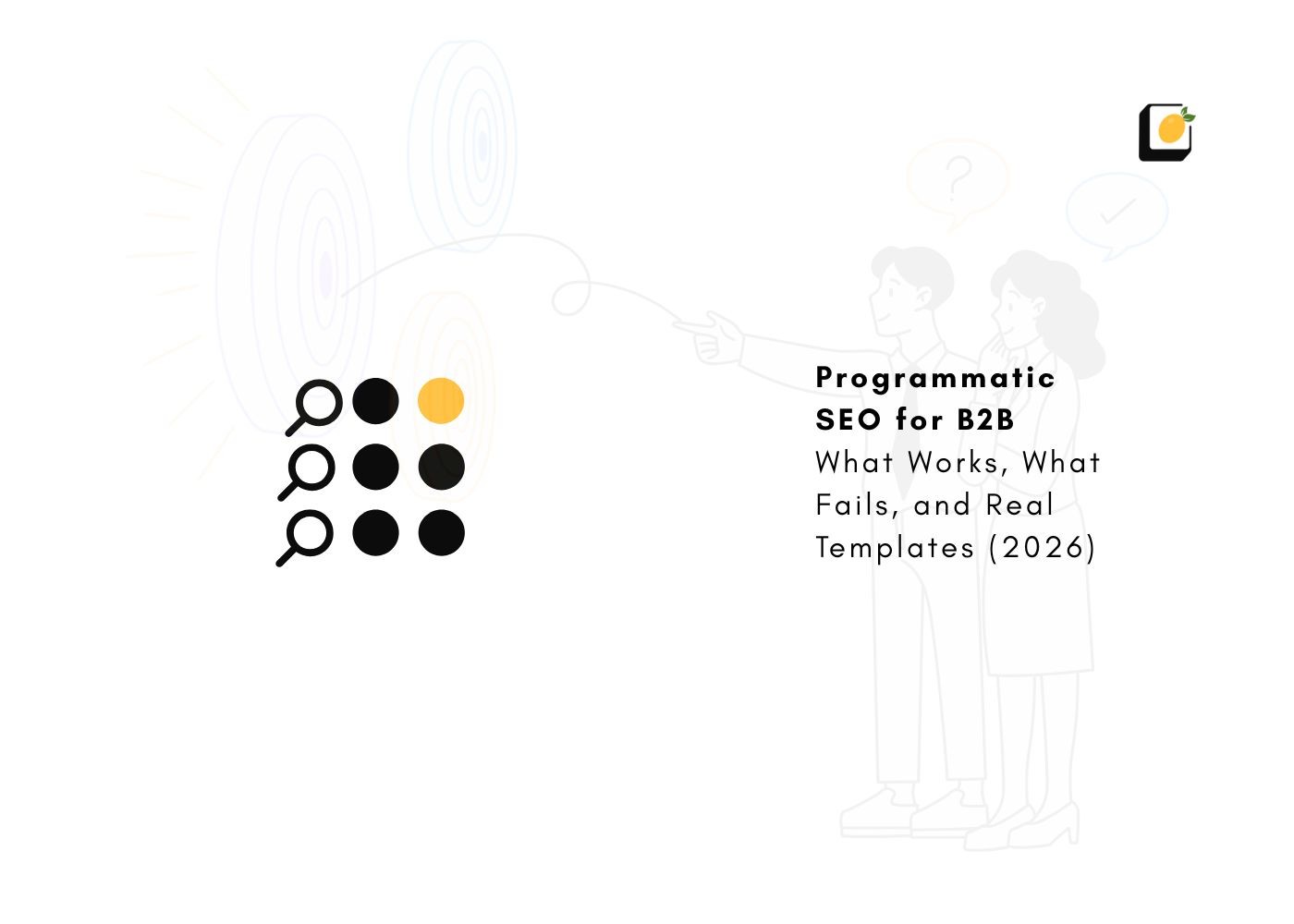DIY SEO Strategies for Lean Startups: No Marketing Team, No Problem
August 25, 2025
Join 500+ brands growing with Passionfruit!
You're a solo founder or part of a tiny startup team. You've got a great product, but there's one huge problem - you can't afford a marketing team. Every marketing agency quotes prices that would eat up your entire runway in three months. Sound familiar?
Here's the good news: you don't need a full marketing team to get your startup visible online. With the right DIY SEO approach and smart marketing strategy, you can compete with companies ten times your size. Thousands of successful startups have built their initial traction without hiring a single marketing person.
This guide will show you exactly how to handle SEO for startups on your own. You'll learn practical SEO marketing tactics that actually work, simple content marketing strategies you can implement today, and how to build a complete marketing plan without burning through your limited budget. No fancy tools required. No previous marketing experience needed. Just clear, actionable steps that any founder can follow.
Why DIY SEO Marketing Works for Lean Startups
Let's address the elephant in the room first. Do you need a marketing team? The honest answer is: eventually, yes. But not right now. Not when you're still finding product-market fit or trying to get your first 100 customers. At this stage, DIY marketing can actually be more effective than hiring an agency or building a team.
What is a marketing team exactly? It's typically a group of specialists - SEO experts, content writers, social media managers, designers, and analysts. Large companies need these specialized roles because they're managing complex campaigns across multiple channels. But as a startup, you have advantages they don't. You know your product inside out. You talk to customers directly. You can make changes instantly without going through layers of approval.
Many successful companies started without formal marketing. What company does not use marketing? Actually, none - but many bootstrapped startups handle it themselves initially. Basecamp, Groove, and Buffer all grew their first thousand customers through founder-led business marketing efforts. The founders wrote blog posts, answered questions on forums, and built relationships with early users. That hands-on approach created authentic connections that no hired team could replicate.
Building Your DIY Marketing Strategy from Scratch
A solid marketing strategy doesn't need to be complicated. Start by answering three simple questions: Who are your ideal customers? Where do they hang out online? What problems are they trying to solve?
Your marketing plan should focus on one channel at a time. Many startup marketing efforts fail because founders try to be everywhere at once. You post randomly on Twitter, write occasional blog posts, and send sporadic emails. That scattered approach rarely works. Instead, pick one channel and master it before moving to the next.
How the 1% rule applies to startup marketing is simple - only 1% of your online audience will actively engage with your content. This means if you want 10 customers, you need to reach at least 1,000 people. If you want 100 customers, you need 10,000 people to see your content. Understanding this ratio helps you set realistic goals and avoid frustration when not everyone immediately signs up for your product.
Content Marketing That Drives Results
Content marketing is the backbone of DIY SEO. Why? Because Google loves fresh, helpful content, and you can create it yourself without any special tools or training. The key is having a clear content strategy that aligns with what your potential customers are searching for.
Start by listing the top 10 questions your customers ask. These become your first blog posts. Don't worry about making them perfect - focus on being genuinely helpful. Write like you're explaining your solution to a friend over coffee. Use simple language, give real examples, and share actual data from your experience.
Marketing ideas that work for small teams include how-to guides, case studies from your early customers, behind-the-scenes posts about building your product, comparisons with alternatives (be fair and honest), and lists of resources your audience will find valuable. The beauty of content marketing is that it keeps working long after you publish. A blog post you write today could bring customers for years.
DIY SEO: Simple Steps for Startups
Now let's get into the actual DIY SEO tactics. SEO for startups doesn't require expensive tools or technical expertise. You just need to understand the basics and apply them consistently.
Small business SEO starts with your website structure. Make sure every page has a clear purpose and title. Use descriptive URLs - "yoursite.com/how-to-reduce-customer-churn" is better than "yoursite.com/blog/post-47". Add meta descriptions that tell people what they'll find on each page.
Your SEO strategy without a marketing team should focus on long-tail keywords first. These are specific phrases like "project management software for remote design teams" rather than just "project management software". They're easier to rank for and attract more qualified visitors.
For keyword research, start with free tools. Google's autocomplete shows you what people actually search for. Type your main topic into Google and see what suggestions appear. The "People also ask" section reveals related questions you should answer. Tools from the best free keyword research tools for small businesses can help you find more opportunities without spending money.
Social Media Marketing Without a Team
Social media marketing might seem overwhelming, but you don't need to be on every platform. Your social media strategy should focus on where your customers actually spend time. B2B startups often find success on LinkedIn and Twitter. B2C companies might focus on Instagram or TikTok.
Social media management for lean startups is about consistency over volume. Post three times a week on one platform rather than once a week on five platforms. Share your blog content, customer wins, product updates, and insights from your industry. Engage with comments and messages promptly - this personal touch is actually an advantage over bigger companies with slower response times.
Social media marketing for startups works best when you're authentic. Share your journey, including the struggles. People root for underdogs. When you're transparent about building your startup, you create connections that polished corporate accounts can't match. Remember to track what resonates with your audience and do more of what works.
Email Marketing Made Simple for Startups
Email marketing remains one of the highest ROI channels for startups. It's direct, personal, and you own the relationship with your subscribers. Building an email list should be a priority from day one.
Lead generation doesn't require complex funnels. Offer something valuable in exchange for email addresses - a guide, template, or tool that solves a specific problem. Place signup forms strategically on your website, especially on your most popular blog posts.
Your marketing campaign through email should provide value, not just promote your product. Follow the 80/20 rule - 80% helpful content, 20% promotion. Share insights, tips, and resources your subscribers can use whether they buy from you or not. This builds trust and keeps people engaged until they're ready to purchase.
Inbound Marketing on a Tight Budget
Inbound marketing means attracting customers through valuable content rather than interrupting them with ads. It's perfect for startups because it requires more time than money. Your digital marketing strategy should focus on being helpful rather than salesy.
Digital marketing for startups works best when you solve real problems. Create content that answers specific questions, provide tools or templates people can use immediately, and share your expertise generously. When you become a trusted resource, selling becomes much easier. Understanding how AI is transforming content creation for SEO can help you create better content faster.
DIY Marketing Tips for Busy Founders
Time is your scarcest resource as a founder. These DIY marketing and marketing tips will help you get maximum results with minimum time investment.
First, batch similar tasks. Write all your blog posts for the month in one sitting. Schedule social media posts for the week in one session. This reduces context switching and makes you more efficient.
Second, repurpose everything. Turn a blog post into multiple social media posts, a newsletter, and maybe even a short video. One piece of content can feed multiple channels when you're marketing your business with limited resources.
Marketing without a team means you need to prioritize ruthlessly. Focus on activities that directly connect you with potential customers. Writing a blog post that answers customer questions is more valuable than perfecting your logo. Building an email list beats having a perfect Instagram aesthetic.
Track what works using simple metrics. How many visitors come to your website? How many sign up for your email list? How many become customers? Tools like Google Analytics help you understand what's working without complex setup. Learning to master SEO in 2025 will help you stay ahead of changes.
Scaling Your DIY Efforts
As you grow, you'll start hitting the limits of DIY SEO and DIY marketing. That's actually a good problem - it means your efforts are working. The key is knowing when to transition from doing everything yourself to getting help.
Start by automating repetitive tasks. Use scheduling tools for social media, email automation for welcoming new subscribers, and templates for common responses. This frees up time for strategic work that only you can do.
Consider hiring freelancers for specific tasks before building a full marketing team. A freelance writer can help with blog posts while you focus on strategy. A part-time virtual assistant can handle social media posting. This gradual approach lets you scale without the commitment of full-time hires.
When you do eventually hire, your DIY experience becomes invaluable. You'll know what works, what metrics matter, and what skills to look for. Many successful companies find their best marketers are founders who started with DIY and learned what actually drives growth.
Conclusion
Not having a marketing team isn't a disadvantage - it's an opportunity to build authentic connections with your early customers. Your DIY SEO efforts might not be perfect, but they'll be genuine. Your content marketing might not be polished, but it will address real problems.
The strategies in this guide aren't just temporary solutions. They're foundational skills that will serve you throughout your entrepreneurial journey. Whether you eventually build a team or continue bootstrapping, understanding SEO marketing and digital marketing strategy makes you a better founder.
Start small. Pick one tactic from this guide and implement it this week. Build momentum gradually. Before you know it, you'll have a marketing engine that rivals companies with entire departments dedicated to growth.
Ready to accelerate your DIY marketing efforts? Get started with Passionfruit to access AI-powered tools that make content creation and SEO optimization easier for solo founders and small teams.
Frequently Asked Questions
1. How much time should I spend on DIY marketing each week? Start with 5-10 hours per week focused on one channel. It's better to be consistent with less time than sporadic with more. As you develop systems and templates, you'll become more efficient.
2. Which marketing channel should I focus on first as a solo founder? Choose based on where your customers are most active. B2B startups often start with content marketing and LinkedIn. B2C companies might prioritize Instagram or TikTok. Pick one and master it before adding others.
3. Can I really compete with companies that have full marketing teams? Yes, by being more authentic, responsive, and focused. Large teams move slowly and create generic content. As a founder, you can share real insights, respond quickly to trends, and build genuine relationships.
4. When should I hire my first marketing person? Consider hiring when marketing tasks consistently take over 50% of your time, or when you have proven channels that need scaling. Start with freelancers or part-time help before committing to full-time roles.
5. What free tools are essential for DIY marketing? Google Analytics for tracking, Google Search Console for SEO insights, Canva for basic design, Buffer or Hootsuite's free tier for social media scheduling, and MailChimp or Substack for email marketing.
















